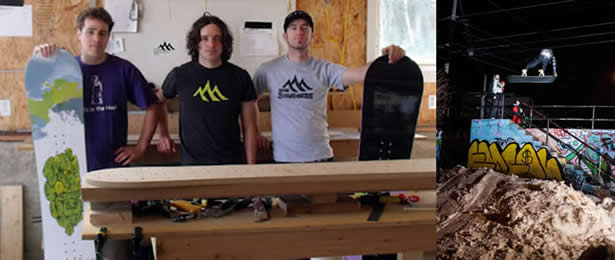News in Brief
Composite Research Network (CRN) Node created at CIC
The CIC is now engaged as the Manitoba Node of the newly created Composite Research Network (www.crn.ubc.ca). The CRN was established in January 2012 and is a Western Canadian network based at The University of British Columbia. It has as its mandate the creation, documentation, and dissemination of composite materials knowledge by linking academic and research organizations to industry. The CRN will provide industry partners with Knowledge in Practice Documents (KPD) whose purpose will be to improve upon existing design and manufacturing processes, understand and systematically overcome repetitive manufacturing issues and enable the pursuit of new business opportunities. Examples of Industry driven KPD needs are:
- Composite Design and Analysis
- Material and Process Selection
- Tool Design and Usage
- Manufacturing Processes
- Quality Verifications
Dr. Jose Cid co-located with the CIC in July, and is the first CRN staff member in Winnipeg. The CRN will quickly ramp up to two Researchers and three Students this Fall. The CIC will leverage its knowledge and capabilities by linking existing and future collaborative industry driven projects to CRN KPD generation. This collaborative CIC-CRN effort will result in an increase in both capability and capacity to support our mutual industrial partners as they develop and improve their composite businesses.

Project Focus
Magine and CIC Showcase Biocomposite Snowboard at BIO 2012
Magine Snowboards and Skis and the CIC have developed a biocomposite snowboard and showcased it at the largest biotechnology convention in the world: BIO 2012. The novel construction includes a wooden laminate core, sandwiched between two layers of Biotex flax fabric, and a top and bottom plastic layer, all bonded together using an eco-epoxy resin system.
Magine, who are based in Newfoundland, Canada, were looking to develop a product in keeping with their core values – freedom of expression, good times and support of the snow sports community – whilst differentiating themselves in the market place.
Steve Wheeler of Magine explains that “Our community is very environmentally conscious where snowboarders are inherently connected with their environment through the sport. On a larger level, global warming and its detriment to the sport also drives us. Therefore, we looked to do our part through developing a more sustainable snowboard, while maintaining the same quality and ride characteristics we all love and enjoy.”
In a project co-funded by the CIC and the Natural Sciences and Engineering Research Council of Canada (NSERC), Magine worked with the University of Manitoba to develop the unique bio-fibre composite snowboard after extensive testing and research with the help of CIC. Prototypes were tested in house, developing a flex profile and comparing to current models and, after six months of development, the snowboard was finally tested on snow, at a local ski hill in Western Newfoundland. “The initial test was so successful that our team rider – Josh Keough – didn’t want to give up the prototype” Wheeler explained. “The bio-fibre snowboard responds, flexes and edges well. Its flex pattern and light-weight make it very comparable to freestyle snowboards for grinds and aerial maneuvers. With the incorporation of the bio-fibre composite material, it stands above many snowboards on the market as a more sustainable product compared to fibreglass and basalt composite snowboards.”
Magine uses a clear top sheet that allows the natural look of the flax fibre weaves and the wood core to create a raw, earthy, aesthetic product, designed to promote sustainability and their commitment to their customers’ values. Magine expect to offer a line of bio-fibre snowboards during the 2012-2013 snowboard season.

